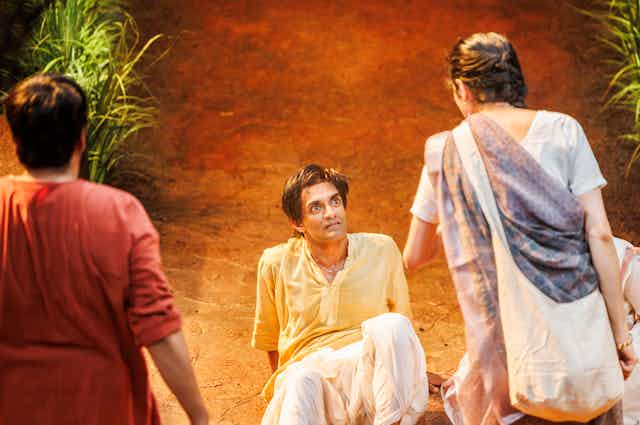We set eyes on Pip, the protagonist of Charles Dickens’s 1861 novel Great Expectations, for the first time in the churchyard where his parents and brothers are buried. The vision of the boy in front of the ruins of his family is one of rude survivalism. It’s a trait that will see Pip through the misadventures ahead – but the sorrow of surviving on these terms is unmistakable.
However, Tanika Gupta’s adaptation of Great Expectations, currently showing at Manchester’s Royal Exchange Theatre, opens with “Pipli” buzzing around, doing cartwheels, at ease in his world. Gupta’s version is set in Bengal in 1899, where alarming rumours of an imminent partition of the province have spread.
It is disorienting at first to see the adult actor (Esh Alladi) impersonating a child. His effervescence seems unlike Pip – or any other Dickensian waif – but we learn that Pipli is drawn to the banks of the river because the ashes of his parents rest there.
As in the novel, an escaped convict (Dickens’s Magwitch) then pounces on the boy, demanding that he fetch him food and a file to unshackle himself.
In this adaptation, Magwitch is an Indian man of African descent, renamed Malik (Andrew French). This is perhaps a nod to Malik Ambar (1548-1626), an Ethiopian slave who rose to power and whose military prowess in the southern peninsula of India was dreaded by the Mughals.
Dickens brought the upper classes to their knees in his novels, exposing the entanglements of gentility and criminality. In Gupta’s version, race enters the mix. The play addresses not only the virulence of British racism toward natives, but the ingrained colourism and phobia of the caste Hindu toward their darker-skinned compatriots – in particular Africans.
Pip and Magwitch
In the Dickens novel, Pip refuses to treat his terrifying encounter with Magwitch as anything other than a “chance occurrence”.
Ironically, it is this encounter which makes Pip a gentleman. Magwitch – who reinvents himself in the penal colony of Australia, where he is transported to – becomes the anonymous benefactor whose colonial labour finances Pip’s education.
Similarly, Malik funnels the fortune he has made in Assam into Pipli’s prospects – and Malik too is denied rehabilitation in the system whose equitable distribution of wealth he aids.
Shocked to see Magwitch/Malik reappear in his London lodgings years later, Pip/Pipli tells him stiffly that he does not wish to renew their accidental acquaintance.

Dickens’s Pip does not treat his entry into Satis House – the estate of Miss Havisham – as the random event it is. He chooses to believe that it is the heiress’s benign scheme to uplift him to high society.
Miss Havisham wreaks havoc, choreographing Pip’s unrequited love for her adopted daughter Estella, and Estella’s cruelty in return. Divested at last of his delusions of kinship with rich folk, Pip describes himself as a “chance boy,” picked to gratify a whim.

Gupta unsparingly portrays the interplay of self-regard and self-loathing in Pipli as he comes of age. The play shines new light on the individualism and elitism shaping Pipli’s deferred outrage at Miss Havisham’s (Catherine Russell) brutality and his withheld affection for his real benefactor.
MacCaulay’s Minute
“You will never become truly English,” Miss Havisham taunts Pipli. She jeers that the colonial education he covets is designed to knock the “Indian” out of a native.
In Gupta’s play, the backdrop to Pipli’s soul-searching is the first partition of Bengal into East and West Bengal (1905). This division was engineered by the British viceroy in India, Lord Curzon. Despite its annulment in 1911, it had a violent climax in the partitioning of the subcontinent in 1947.
Nationalist resistance against this partition, supposedly carried out for administrative convenience and uniform material development of the region, mobilised a mass movement demanding self-rule and self-sufficiency.
Pipli’s lawyer, Jaggers (Stephen Fewell), tells him bluntly that he will amount to nothing more than an interpreter. This echoes politician Thomas Babington Macaulay’s Minute Upon Indian Education (1835), which shaped British educational policy. It was designed to create “a class of persons, Indian in blood and colour, but English in taste, in opinions, in morals, and in intellect”.
The Macaulay Minute ushered a colonial modernity no longer reliant on the indigenous literature and culture and bred mimic men fully compliant with British rule.
Malik, sustained by his dream of vengeance against the British, imagines that his “boy” Pipli, “with his education, will teach them”. It is left to Pipli to realise that his English education is a poison as well as a cure.
The language issue

The treatment of language in decolonising Dickens’s Great Expectations is a missed opportunity. In the absence of any Bangla, the choice of context – the partition, which powerfully mobilised Bengali identity – seems random. Furthermore, little attention is paid to differences between Bengali Hindus and Muslims when it came to their respective reckonings of Curzon’s division.
The “Indian” characters speak English with an accent, while the native languages are spoken in crisp received pronunciation. This is clever, but reinforces once again the power of English to stand in as both global language and local vernacular.
Adaptations of classics can imply a warped power structure, the latecomer writing back to a precursor from the erstwhile ruling classes. It also implies a shift in power, whereby the adaptation reinvents an old staple, drawing attention to the necessity of timely tune-ups. Tanika Gupta’s Great Expectations succeeds in giving itself – and its famous namesake – what Pip calls “a chance in life.”

Looking for something good? Cut through the noise with a carefully curated selection of the latest releases, live events and exhibitions, straight to your inbox every fortnight, on Fridays. Sign up here.

